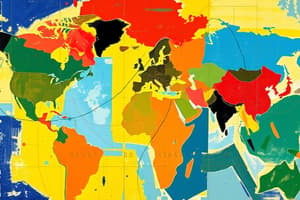Podcast
Questions and Answers
What is interregional migration?
What is interregional migration?
Movement from one region of a country to another.
What is intraregional migration?
What is intraregional migration?
Movement within one region.
What characterizes voluntary migration?
What characterizes voluntary migration?
The migrant has chosen to move for economic improvement.
Match Zelinsky's stages of migration transition with their descriptions:
Match Zelinsky's stages of migration transition with their descriptions:
What is the family status of migrants?
What is the family status of migrants?
What is noted about the gender of migrants?
What is noted about the gender of migrants?
Study Notes
Migration Types
- Interregional Migration: Movement occurs from one region of a country to another.
- Intraregional Migration: Movement takes place within a single region.
Voluntary Migration
- Migrants choose to relocate primarily for economic improvement opportunities.
Zelinsky's Stages of Migration Transition
- Stage 1: Characterized by high daily or seasonal mobility focused on food rather than permanent relocation.
- Stage 2: Emergence of international migration and interregional movement from rural areas to urban centers due to agricultural advancements and technological changes that reduce rural labor needs. Urban factory jobs attract migrants.
- Stages 3 & 4: Migrants continue to seek economic opportunities; intraregional movement occurs, primarily from urban areas to surrounding suburbs.
Family Status of Migrants
- Approximately 40% of immigrants are young adults aged 25-39, often migrating alone.
- Children represent about 16% of recent immigrants to the U.S, showing a shift in family migration patterns.
Gender of Migrants
- Predominantly, long-distance migrants are men due to higher employment opportunities.
- An increase in female migration is observed, reflecting changes in societal roles.
Studying That Suits You
Use AI to generate personalized quizzes and flashcards to suit your learning preferences.
Description
Explore key concepts in migration with these flashcards. This set covers interregional and intraregional migration, voluntary migration, and Zelinsky's stages of migration transition. Perfect for studying the dynamics of human movement within and across regions.




